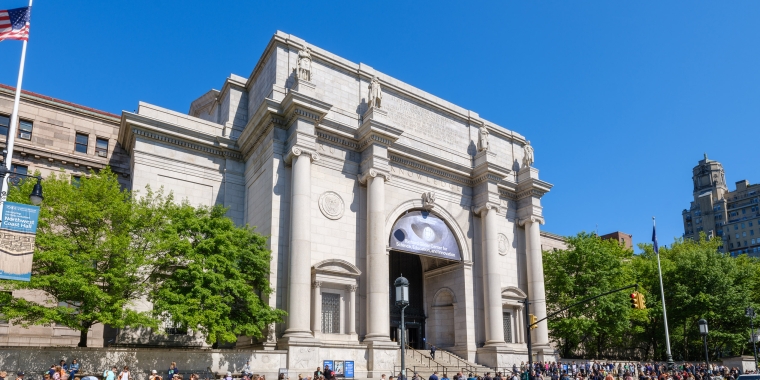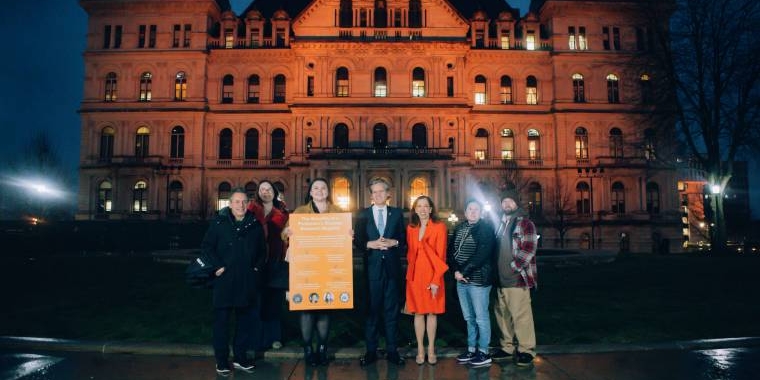
State Legislators File Amicus Brief to Protect Parks from NYU’s Greenwich Village Expansion
Brad Hoylman
May 5, 2015
-
ISSUE:
- Housing
- Community Development

State Sen. Brad Hoylman and 22 Members of the Legislature file ‘friend of the court’ brief in support of Assembly Member Deborah Glick and Greenwich Village residents
State lawmakers argue NYC and NYU violated legislative prerogative under Public Trust Doctrine, only Legislature can alienate parkland
Hoylman: "The only thing NYU alienated was the goodwill of the Greenwich Village community"
NEW YORK – State Senator Brad Hoylman (D-Manhattan) and 22 members of the New York State Legislature filed an amicus brief with the New York Court of Appeals in an effort to help protect state parkland from New York University’s massive expansion in Greenwich Village.
The lawmakers’ brief – which supports the lawsuit by Assembly Member Deborah Glick and an array of Greenwich Village community groups in the case Glick v. Harvey – argues that the City Council’s decision to authorize NYU to seize public parkland for development violated the Public Trust Doctrine, and that the State Legislature is the only entity that can legally make such an authorization.
According to the brief, “It is the Legislature that must determine whether to enact a law permitting a local government to alienate parkland, and, if so, on what conditions.” The brief argues that the State has a “unique and irreplaceable role as the trustee of public lands,” and that a lower court’s ruling in favor of the NYU expansion “diminishes the State’s authority over parkland and impermissibly reallocates that authority to the City.”
State Senator Brad Hoylman said: “The law is clear that NYU should have sought the approval of the New York State Legislature for the alienation of this public parkland, but the only thing the university ended up alienating was the goodwill of the Greenwich Village community. I’m proud to stand with Assembly Member Deborah Glick and my colleagues in the Senate and Assembly on this important point of state legislative prerogative, which exists to help thwart hasty local governmental decisions such as the very kind in this case that would result in the destruction of our precious public parks."
Assembly Member Deborah J. Glick said: “For many years, park alienation legislation has come to the Legislature from communities all over the State, including New York City. The desire to assist a powerful private institution should not obviate the normal processes of government.”
NYU’s proposed development plan would seize four parks—two children’s playgrounds, a communal garden, and a dog run—located in two Greenwich Village superblocks bounded by West 3rd Street, Houston Street, Mercer Street and LaGuardia Place, that have been continuously used for recreation for decades. NYU’s plan was approved by the City Council in 2012 but has since been challenged in court. The case currently stands before the New York State Court of Appeals.
Signers of the amicus brief include Senator Brad Hoylman; Senator Bill Perkins; Senator Gustavo Rivera; Senator Daniel L. Squadron; Senator Liz Krueger; Assembly Member Harry B. Bronson; Assembly Member Ellen Jaffee; Assembly Member Jeffrey Dinowitz; Assembly Member Kevin A. Cahill; Assembly Member Crystal D. Peoples-Stokes; Assembly Member Victor M. Pichardo; Assembly Member Barbara Lifton; Assembly Member William Colton; Assembly Member Catherine Nolan; Assembly Member Steve Englebright; Assembly Member Steven Otis; Assembly Member Daniel J. O'Donnell; Assembly Member Michelle Schimel; Assembly Member Jo Anne Simon; Assembly Member Fred W. Thiele, Jr.; Assembly Member Keith L.T. Wright; Assembly Member Andrew P. Raia and Assembly Member Chad A. Lupinacci
The brief, which can be found attached, was written and filed pro bono by the law firm Weil, Gotshal & Manges LLP.
State Senator Daniel Squadron said: "Understanding the impacts of new development is a crucial part of community planning, but NYU’s expansion plan failed to include open space available to the community protected as parkland," said State Senator Daniel Squadron. "In our state, public parkland cannot be alienated without approval by the New York State Legislature -- a doctrine we urge the court to recognize in this case. I will continue working with Senator Hoylman, Assemblymember Glick, my colleagues and the community to ensure state parkland is protected."
State Senator Liz Krueger said: "Our parks are scarce and precious resources that exist for the benefit of all New Yorkers. The Public Trust Doctrine ensures that communities have a say in determining the fate of their parks, and that is why it must be upheld. I commend and support the efforts of Assemblymember Glick and the local community to make sure the appropriate legislative process is followed - the residents of Greenwich Village and everyone who enjoys these parks deserve to have their voices heard."
State Senator Bill Perkins said: "Vital and collective community resources, such as our precious City parkland must not be alienated at will or by the whim of monolithic institutions. The very essence of our communities is at stake in this fight and others akin to it all over our City. I strongly urge the Court to review this case with the strictest of scrutiny with respect to the Public Trust Doctrine."
Assembly Member Jeffrey Dinowitz said: “Parkland must be protected and should never be treated as real estate, especially in densely populated urban areas. When New York City insisted it could build in Van Cortlandt Park without first coming to the Legislature we proved them wrong. Likewise, NYU should not be able to build without the Legislature authorizing park alienation.”
Assembly Member Jo Anne Simon said: “The very purpose of our longstanding laws governing the alienation of parkland demands great scrutiny in order to ensure that the public’s interest is truly served. Land use swaps by unauthorized entities to facilitate private development at the cost of the public’s use and enjoyment of park space do not rise to that standard and thwart the very purpose of our constitutional protections.”
###

